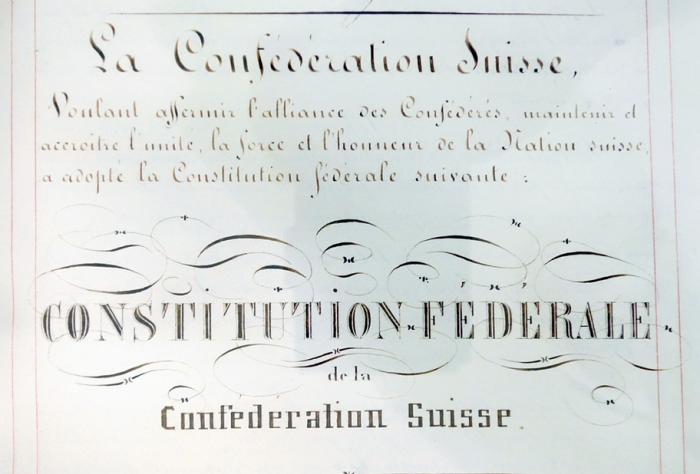December 6, 2016
The Swiss constitution and languages

The Federal Constitution of the Swiss Confederation, the current version of which dates from 1999, forms the basis for plurilingualism with the aim of promoting “the internal cohesion and cultural diversity of the country”. It defines four principles: equal status among languages, citizens’ freedom to use any language, language territoriality and protection of the minority languages. Various Articles in the Constitution involve language policies: for example, Art. 4 “National languages”; Art. 18 “Freedom to use any language” and especially Art. 70 “Languages”; in part Art. 8 “Equality before the law”; Art. 31 “Deprivation of liberty”; Art. 62 “School education”; and Art. 175, which regulates the composition and election of the Federal Council.
The Swiss Federal Constitution of 1848 was one of the first of its kind in Europe. It defined three national languages – German, French and Italian – at a time when many nations were formed on the basis of uniform cultural identities. Romansh was added almost a century later, in 1938. Today’s constitution is therefore the result of an ongoing process and a long evolution regarding the status of the national languages.
Article 4 designates Switzerland’s national languages. They are German, French, Italian and Romansh. The boundary between the French and German language runs from Basel in the northwest to Italy in the south. The boundary between the Italian and German language is demarcated by the Gotthard Massif. And finally, Romansh comprises various enclaves in the Canton of Graubünden. Approximately 65% of the Swiss population speaks German as their mother tongue (17 cantons are solely German-speaking), 25% speaks French as their mother tongue (4 cantons are solely French-speaking), approximately 10% speaks Italian as their mother tongue (1 canton is solely Italian-speaking) and less than 1% speaks Romansh as their mother tongue.
Article 18 deals with the freedom to use any language, which guarantees citizens the freedom to choose their language.
Article 70 comprises several important elements: Paragraph 1 stipulates that the Confederation has three equal, official languages: namely, German, French and Italian. Romansh is also an official language of the Confederation when communicating with persons who speak Romansh. Paragraph 2 specifies that the cantons shall decide on their official language(s). Paragraph 3 refers to the responsibility of the Confederation and the Cantons to encourage understanding and exchange between the linguistic communities. Finally, the last two paragraphs refer to financial support from the Confederation, on the one hand granted to plurilingual Cantons in the fulfilment of their special duties and, on the other hand, to support measures by the Cantons of Graubünden and Ticino to preserve and promote the Romansh and Italian languages.
Paragraph 2 of Art. 70 goes even further: It obliges the Cantons to take account of indigenous linguistic minorities and to respect the traditional territorial distribution of languages. This is what is known as the “principle of territoriality”, the foundation of Switzerland’s plurilingualism. It involves guaranteeing languages their own territory, a particularly important consideration in the case of Romansh, a minority language. On occasion, this key principle allowing for a consolidation of a language territory can contradict the principle of the freedom to use any language (Art. 18), which guarantees any person, irrespective of nationality, the right to use their own language in relationships to others, namely, in professional and personal relationships.
Several other aspects of the Constitution also pertain to the language issue. Paragraph 2 of Art. 8 “Equality before the law” emphasises that no person may be discriminated against on grounds of language. Paragraph 2 of Art. 31 “Deprivation of liberty”, which pertains to legal proceedings, stipulates that any person deprived of their liberty has the right to be notified without delay and in a language they can understand. Paragraph 4 of Art. 62 “School education” takes up the language issue again and specifies that the Confederation shall issue the necessary regulations when harmonisation of school education is not achieved by means of coordination (and thereby the teaching of foreign languages). Lastly, Paragraph 4 of Art. 175 emphasises that the various geographical and language regions of the country are appropriately represented when electing the Federal Council.


Comments